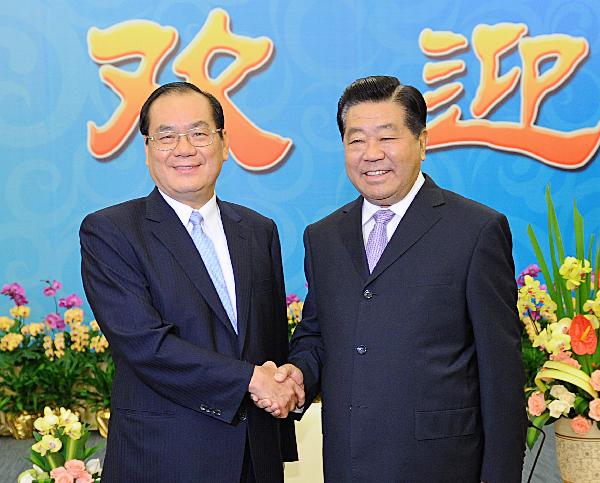Photos
Sound cross-Strait relations must be maintained: official
Updated: 2011-06-12 07:46
(Xinhua)
XIAMEN, Fujian - Top Chinese political advisor Jia Qinglin said Saturday that the sound development of relations between the Chinese mainland and Taiwan "must be maintained" and "progress must be advanced."
In his meeting with about 110 Taiwanese guests who are in Xiamen of southeastern Fujian Province to attend the third Straits Forum, Jia said hardships and problems will be conquered and more understanding and support from the Taiwan public will be earned, as long as both sides build mutual trust and solve problems gradually, "with easier things first."
He said cross-Strait relations must be "stabilized" to consolidate the shared political foundation of opposing "Taiwan independence" and sticking to the 1992 Consensus, based on which, both sides of the Strait adhere to the one-China principle.
"Grassroots people on both sides pursue a stable and happy life, instead of turbulence in cross-Strait relations," said Jia, chairman of the National Committee of the Chinese People's Political Consultative Conference.
The mainland and Taiwan should unite to jointly "safeguard the Chinese image and the immediate interests of people on both sides" and promote the "overall interests" of the Chinese nation, Jia added.
He also said both should pursue mutual benefits and consider concerns of the other side so as to ensure that "both sides enjoy benefits and feel happy."
Entrusted by Communist Party of China (CPC) Central Committee General Secretary Hu Jintao, Jia, on behalf of the CPC Central Committee, extended "warm welcome and sincere greetings" to Taiwanese coming across the Strait to attend the unofficial forum.
Jia said the forum provided "a stage for grassroots people across the Strait" and received great support from many social groups and various circles from both sides, attracting an increasing number of people attendance.
With the theme of expanding civilian exchanges, strengthening cooperation and promoting common development, the forum is attended by more grassroots people and non-governmental organizations and focuses more on people's livelihoods, Jia said.
"The remarkable progress in cross-Strait relations over the past three years shows that our policies to promote peaceful development of cross-Strait relations are feasible and accord with common interests of both sides," he said.
Development of cross-Strait relations would face many opportunities and efforts should be made to strengthen links between the mainland's 12th Five-Year Plan (2011-2015) and Taiwan's "Golden Decade" blueprint, Jia said.
He also called for well implementing the cross-Strait Economic Cooperation Framework Agreement (ECFA) that took effect last September and promised a package of tariff reduction for Taiwanese products imported to the mainland, in order to achieve more economic mutual benefits and "let tens of thousands of Taiwanese families receive more tangible benefits."
Jia said that cross-Strait relations would face a "crucial point" in the near future and "it's a realistic and significant task facing people of both sides to maintain a sound relationship, seize the opportunity, effectively expel disturbance and properly solve problems."
Tseng Yung-chuan, vice chairman of Taiwan's ruling Kuomintang (KMT) party, said major progress had been made in cross-Strait cooperation, noting that the two sides had held seven economic and cultural forums, six negotiations between two organizations authorized to handle cross-Strait affairs, and two Straits forums focusing on civilian exchanges.
A KMT-CPC platform was also established to strengthen communication, Tseng said, calling for "shelving disputes" and achieving mutual benefits.
On Saturday evening, Tseng told an opening ceremony of the Straits Forum in Xiamen that the relationship between the mainland and Taiwan had gone through hardship in the past and entered "a new stage of peace, prosperity and stability after KMT coming into power."
The mainland and Taiwan have witnessed a comprehensive warming relationship over the past few years, especially after the KMT, led by a new generation of leaders, returned to power in the 2008 Taiwan election, ending eight years of rule by pro-secession Chen Shui-bian and the Democratic Progressive Party.
Specials

Wealth of difference
Rich coastal areas offer contrasting ways of dealing with country's development

Seal of approval
The dying tradition of seal engraving has now become a UNIVERSITY major

Making perfect horse sense
Riding horses to work may be the clean, green answer to frustrated car owners in traffic-trapped cities
